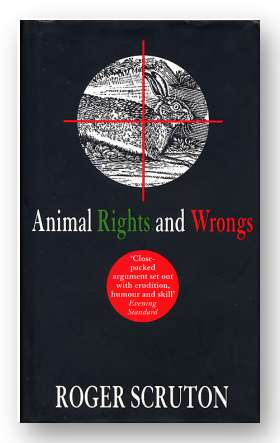Reviewed by Graham Marsden
Out the window goes sentimental claptrap from a bunny hugger. Outthe window go silly excuses like, “I just enjoy the surroundings,”for going fishing. In comes a generous dose of plain old common senseand some extraordinarily deep thinking from a philosopher whodissects the relationship between human beings and animals with a penas sharp as a scalpel. I have to say that this is the best and mostsensible book on animal rights I’ve ever read by a non-angler.
Roger Scruton is a writer and philosopher. Formerly a professor atBirbeck College, London, and Boston University, Massachusetts, he nowlives as a freelance writer in Wiltshire.
He asks some very pertinent questions of the reader:
- Why are animal rights groups so keen to protect the rights of badgers and foxes but not of rats or mice or even humans?
- How can we bridge the growing gap between rural producers and urban consumers?
- Why is raising animals for fur more heinous than raising them for their meat?
- Are we as human beings driving other species either to extinction or to a state of dependency?
I hope the reader will excuse the fact that the best part of thisreview will be quotes from the book, but really, I make no excusesfor that, for Roger Scruton’s own words best describe what it is allabout.

Take this for instance: “Organisations like the RSPCA, theInternational Fund for Animal Welfare and PETA (People for theEthical Treatment of Animals) devote prodigious resources to theattempt to abolish fox hunting, seal hunting, deer hunting, anglingand shooting, while ignoring altogether the argument that theseactivities, properly conducted, do more to conserve habitats andspecies than any amount of sentimental concern for the individualvictim.”
And this: “Public discussion meanwhile has become ever moreconfused…….People lack the concepts that would enable themto understand the deep differences between animals and humans. Theold ideas of the soul, free will and eternal judgement, which madethe distinction between people and animals so important and so clear,have lost their authority…….”
And then right to the heart of the matter: “Now the division isbetween pets and pests, distinguished not by their habits, but bytheir appearance.”
Scruton then lists the deer, the fox, the mink and the badgeramong pets, with the comment that they are among the most destructiveanimals at large in the countryside. With toads, water rats, grasssnakes and spiders as pests and yet which, in reality, are amongstthe most useful to mankind, vital to the ecological system and insteady decline.
He then makes the observation that in the eyes of many otherwiserational and decent people rats may be used in medical experiments,but not cats, mice may be hunted by cats, but not foxes by hounds,and so on.
And then the most telling comment: “…….this divisionbetween the pet and the pest has no basis in reality. Nor is it ofany help to the animals themselves, who can benefit from ourtreatment only if they are not forced to behave as honorary membersof the human species.”
He covers a great many aspects of our treatment of animals,including thoughts on farming, hunting and fishing, all of which areinteresting, enlightening, and thought provoking.
Scruton is not an angler but he has this to say about our sport:”It (angling) is of great environmental significance, since itprovides human beings with a pressing interest in maintainingunpolluted waterways and in preventing the destruction of river banksand their flora. It offers a positive contribution to the balance ofnature and also to the well-being of the huntedspecies…….it is unquestionable that angling ismorally permissible.
“Angling makes a massive contribution to the sum of humanhappiness. If we are to consider the interests of all the animalsinvolved, then we must surely place this fact in the balance, alongwith the equally evident fact that the angler’s quarry is maintainedand protected by those who hunt it.”
Of course, his views are not all pro-angling. He writes about thepain that fish feel, although it must be said that there isscientific evidence now to refute much of this view.
He ends his chapter on angling with these words: “Serious anglersrespect their quarry, are gentle when they can be (for example, whenextracting the hook) and regard the sport as an equal contestgoverned by the rules of fair play. It seems to me that there isnothing vicious in this and therefore no grounds for a moralcondemnation.”
I have merely scratched the surface of the book in this review. Itis full of philosophical common sense; full of observations that youread and think, ‘how true, I never thought of that.’ He puts intounderstandable English those thoughts that often cross our minds thatwe were previously unable to construct and clarify. He has askedquestions about animals in a way that taps into a deeper well ofthought and feeling.
It is a book for all people, on both sides of the animal rights’fence, to read and thoroughly digest, before ever constructinganother argument either for or against hunting and fishing.
With thanks to Ron Clay for recommending the book to me in thefirst place.
| Animal Rights and Wrongs |
| By Roger Scruton |
| Published by Metro Books in association with Demos |
| First published in 1996, 2nd edition1998, and now 2000 |
| ISBN 1 900512 81 5 |
| £ 12.99 |













